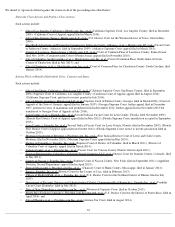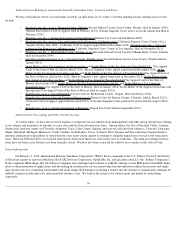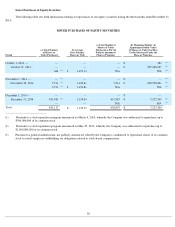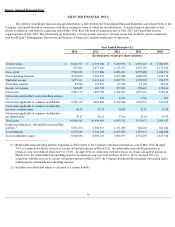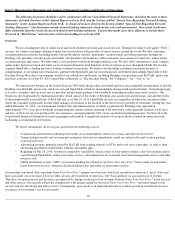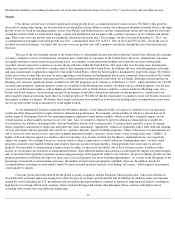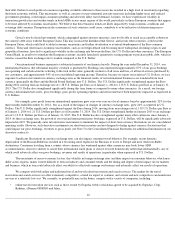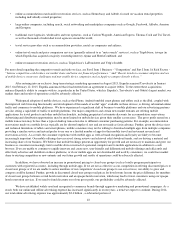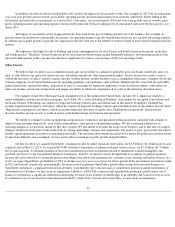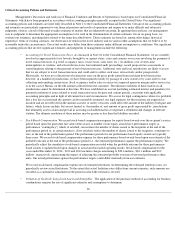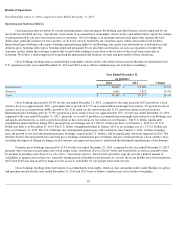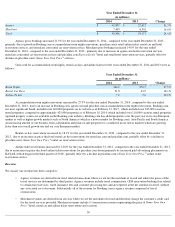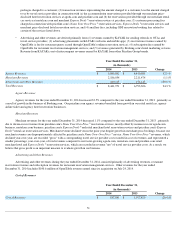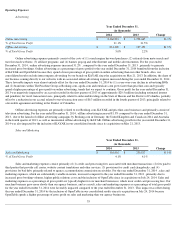Priceline 2014 Annual Report Download - page 47
Download and view the complete annual report
Please find page 47 of the 2014 Priceline annual report below. You can navigate through the pages in the report by either clicking on the pages listed below, or by using the keyword search tool below to find specific information within the annual report.
For more detail regarding the competitive trends and risks we face, see Part I Item 1 Business - "Competition" and Part I Item 1A Risk Factors -
" Intense competition could reduce our market share and harm our financial performance. " and " Recent trends in consumer adoption and use
of mobile devices create new challenges and may enable device companies such as Apple to compete directly with us. "
After entering into an exclusive, long-term strategic marketing agreement in August 2013, Expedia acquired Travelocity in January
2015. On February 12, 2015, Expedia announced that it had entered into an agreement to acquire Orbitz. To the extent these acquisitions
enhance Expedia's ability to compete with us, in particular in the United States, which is Expedia's, Travelocity's and Orbitz's largest market, our
market share and results of operations could be adversely affected.
Widespread adoption of mobile devices, such as the iPhone, Android-enabled smart phones and tablets such as the iPad, coupled with
the improved web browsing functionality and development of thousands of useful "apps" available on these devices, is driving substantial online
traffic and commerce to mobile platforms. We have experienced a significant shift of business to mobile platforms and our advertising partners
are also seeing a rapid shift of traffic to mobile platforms. Our major competitors and certain new market entrants are offering mobile
applications for travel products and other mobile functionality, including proprietary last-minute discounts for accommodation reservations.
Advertising and distribution opportunities may be more limited on mobile devices given their smaller screen sizes. The gross profit earned on a
mobile transaction may be less than a typical desktop transaction due to different consumer purchasing patterns. For example, accommodation
reservations made on a mobile device typically are for shorter lengths of stay and are not made as far in advance. Further, given the device sizes
and technical limitations of tablets and smart phones, mobile consumers may not be willing to download multiple apps from multiple companies
providing a similar service and instead prefer to use one or a limited number of apps for their mobile travel and restaurant research and
reservation activity. As a result, the consumer experience with mobile apps as well as brand recognition and loyalty are likely to become
increasingly important. Our mobile offerings have received strong reviews and achieved solid download trends, and are driving a material and
increasing share of our business. We believe that mobile bookings present an opportunity for growth and are necessary to maintain and grow our
business as consumers increasingly turn to mobile devices instead of a personal computer and to mobile applications in addition to a web
browser. If we are unable to continue to rapidly innovate and create new, user-friendly and differentiated mobile offerings and efficiently and
effectively advertise and distribute on these platforms, or if our mobile apps are not downloaded and used by consumers, we could lose market
share to existing competitors or new entrants and our future growth and results of operations could be adversely affected.
In addition, we have observed an increase in promotional pricing to closed user groups (such as loyalty program participants or
customers with registered accounts), including through mobile apps. If we are not as effective as our competition in offering discounted prices to
closed user groups or if we are unable to entice members of our competitors' closed user groups to use our services, our ability to grow and
compete could be harmed. Further, growth in discounted closed user group retail prices for hotel rooms lessens the price difference for members
of closed user groups between a retail hotel reservation and an opaque hotel reservation, which may lead to fewer consumers using our opaque
hotel reservation services. If we need to fund discounts out of our gross profit, our profitability could be adversely affected.
We have established widely used and recognized e-commerce brands through aggressive marketing and promotional campaigns. As a
result, both our online and offline advertising expense has increased significantly in recent years, a trend we expect to continue. During 2014,
our total online advertising expense was approximately $2.4 billion , a substantial portion of
43
• online accommodation search and/or reservation services, such as HomeAway and Airbnb, focused on vacation rental properties,
including individually owned properties;
• large online companies, including search, social networking and marketplace companies such as Google, Facebook, Alibaba, Amazon
and Groupon;
• traditional travel agencies, wholesalers and tour operators, such as Carlson Wagonlit, American Express, Thomas Cook and Tui Travel,
as well as thousands of individual travel agencies around the world;
•
travel service providers such as accommodation providers, rental car companies and airlines;
• online travel search and price comparison services (generally referred to as "meta-search" services), such as TripAdvisor, trivago (in
which Expedia has acquired a majority ownership interest), Qunar and HotelsCombined; and
•
online restaurant reservation services, such as TripAdvisor's LaFourchette and Yelp's SeatMe.


